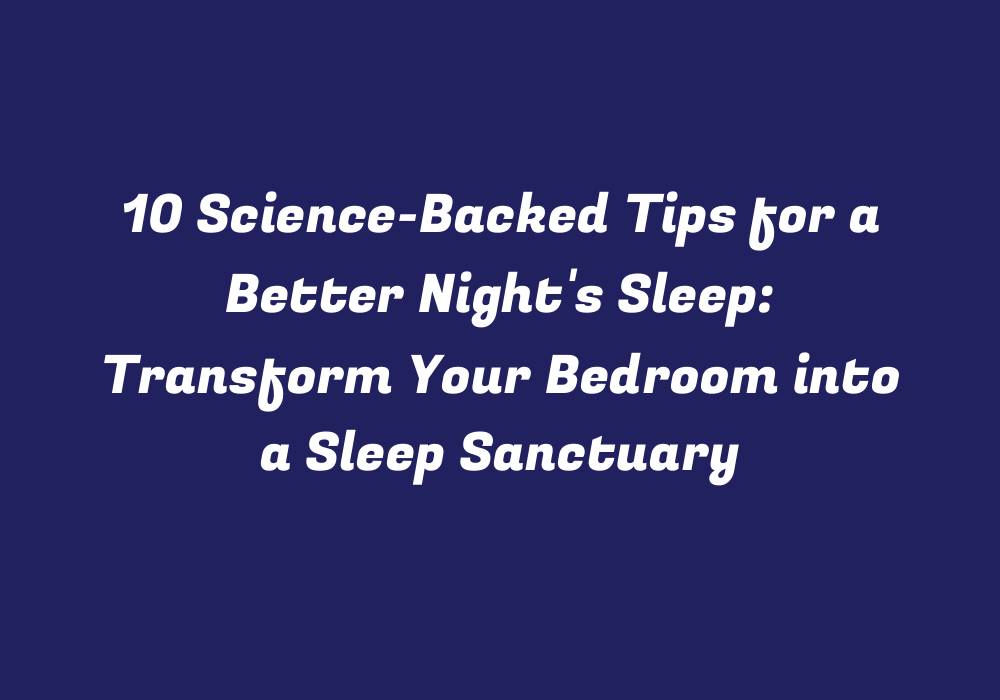Transform Your Bedroom into a Sleep Sanctuary with These 10 Science-Backed Tips for Better Sleep
Introduction
A good night’s sleep is essential for our well-being, yet it often eludes us. Poor sleeping habits and environmental factors can negatively impact our ability to rest soundly throughout the night. To help you improve your sleep quality and create a conducive environment for restful slumber, here are ten science-backed tips to turn your bedroom into a sleep sanctuary.
1.
Establish a Sleep Routine
One of the most effective ways to enhance sleep is by creating a consistent bedtime routine. A regular routine signals your body and mind that it’s time to wind down for the night, making it easier to fall asleep and stay asleep. Stick to going to bed at the same time each night, waking up at the same time every morning, and avoid daytime napping when possible.
2.
Maintain a Cool and Dark Environment
To promote better sleep, keep your bedroom at a slightly cool temperature (around 65-70°F) and maintain darkness. Invest in heavy curtains or blackout blinds to block out light from outside sources like streetlights and electronic devices. Additionally, consider using a white noise machine to mask distracting sounds that may prevent you from falling asleep.
3.
Invest in Comfortable Bedding
A comfortable mattress, pillow, and bed linens can make a significant difference in your sleep quality. Choose a supportive mattress that suits your preferred sleeping position, and opt for a pillow that supports the natural curve of your neck when you’re lying down. Consider using breathable bed sheets made from materials like cotton or bamboo to keep you cool and comfortable throughout the night.
4.
Minimize Electronic Devices in Your Bedroom
Exposure to blue light from electronic devices like smartphones, tablets, and TVs can disrupt our circadian rhythm and make it harder to fall asleep. Minimize the use of these devices in your bedroom or turn them off at least an hour before bedtime to help improve sleep quality. If you must have a TV in your room, consider installing blackout curtains on it to reduce light emission.
5.
Limit Caffeine and Alcohol Intake
Caffeine and alcohol consumption can interfere with sleep quality by disrupting sleep patterns. Limit your caffeine intake, especially in the afternoon and evening, and avoid consuming any alcohol within a few hours of going to bed. Instead, opt for decaffeinated beverages or herbal teas that have a calming effect on the body.
6.
Incorporate Mindfulness Techniques
Mindfulness practices can help you unwind and focus on the present moment, promoting relaxation and reducing stress levels. Before bedtime, try practicing deep breathing exercises or a guided meditation to ease your mind and body into a more restful state.
7.
Avoid Heavy Meals Late in the Evening
Eating large meals or spicy foods right before bed can interfere with digestion, causing discomfort and making it difficult to fall asleep. Stick to lighter meals a few hours prior to bedtime to ensure your body has ample time to digest properly.
8.
Limit Daytime Napping
While daytime naps may seem tempting, especially if you’re sleep-deprived, they can disrupt your overall sleep pattern. Avoid napping for more than 30 minutes during the day to prevent disruptions in your nighttime sleep. If possible, try to nap earlier in the day to help maintain a consistent bedtime routine.
9.
Exercise Regularly but not too Close to Bedtime
Regular exercise has been proven to improve sleep quality by promoting better relaxation and overall well-being. However, engaging in intense physical activity just before bed can elevate heart rate and body temperature, making it more challenging to fall asleep. Aim for moderate exercise at least a few hours before your bedtime to reap the benefits without disrupting your sleep.
10.
Create a Relaxing Bedroom Atmosphere
Invest in comfortable bedding, create a soothing atmosphere with soft lighting, and use essential oils like lavender to promote relaxation. Keep the bedroom tidy and free of clutter to encourage a sense of calm and serenity when you enter your sleep sanctuary.
Conclusion
By implementing these science-backed tips into your daily routine and transforming your bedroom into a sleep-friendly environment, you’ll be well on your way to better sleep and improved overall health. Embrace the power of good habits, create a conducive environment, and enjoy the benefits of quality sleep every night.
